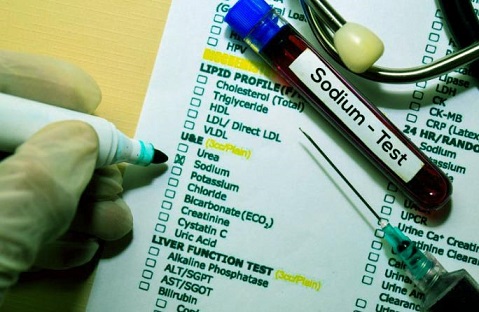Sebastian Lavoie Fact checked by:Thailand Medical News Team Sep 04, 2024 1 year, 3 months, 3 weeks, 4 hours, 12 minutes ago
Medical News: A recent study conducted by researchers from the Federal University of São Paulo and the Instituto Israelita de Ensino e Pesquisa Albert Einstein in Brazil has shed light on the significant impact of hyponatremia - low sodium levels in the blood - on the outcomes of COVID-19 patients. This
Medical News report delves into the findings of this study, which highlights how sodium imbalances could serve as an early indicator of severe COVID-19 complications.
 Hyponatremia as a new predictor for severe COVID-19 outcomes
Understanding Hyponatremia in COVID-19
Hyponatremia as a new predictor for severe COVID-19 outcomes
Understanding Hyponatremia in COVID-19
Hyponatremia, defined as a serum sodium level below 135 mEq/L, has been observed in a significant portion of COVID-19 patients. Sodium is an essential electrolyte that helps regulate water balance and nerve function in the body. When sodium levels drop too low, it can lead to a variety of symptoms ranging from mild headaches and nausea to more severe conditions such as seizures and coma.
The study, which included 558 patients hospitalized with COVID-19 during the first wave of the pandemic, found that 35.3% of these patients had hyponatremia at the time of admission. This condition was linked to a higher likelihood of requiring intensive care unit (ICU) admission and invasive mechanical ventilation (IMV), indicating a more severe disease progression.
Key Findings: Sodium Levels as Predictors
The research revealed several important correlations between sodium levels and COVID-19 outcomes. For instance, patients with lower sodium levels were more likely to experience severe symptoms such as dry cough, anorexia, and nausea/vomiting. Additionally, these patients had lower diastolic blood pressure, a factor that further complicates the clinical picture.
Interestingly, the study also found that certain laboratory parameters could predict sodium levels. Patients with lower sodium levels tended to have higher levels of arterial blood glucose and an increased neutrophil-to-lymphocyte ratio, both of which are markers of inflammation and stress in the body. On the other hand, higher sodium levels were associated with better oxygenation (pCO2) and metabolic indicators (bicarbonate and base excess), suggesting that these patients were better able to cope with the disease.
Hyponatremia and COVID-19 Severity
The findings of this study are particularly important because they suggest that hyponatremia can be used as a tool for risk stratification in COVID-19 patients. Patients with lower sodium levels were more likely to require ICU care and mechanical ventilation, making early detection of hyponatremia crucial for timely intervention.
The study also found that certain groups of patients were more prone to developing hyponatremia, including those with underlying conditions such as cancer and those undergoing immunosuppressive therapy. These patients, already at higher risk due to their compromised immune systems, showed even worse outcomes when affected by COVID-19-related
hyponatremia.
The Biological Mechanisms Behind Hyponatremia in COVID-19
The exact mechanisms by which COVID-19 leads to hyponatremia are complex and multifaceted. One possibility is that the syndrome of inappropriate antidiuretic hormone secretion (SIADH) plays a role. SIADH leads to the retention of water and dilution of sodium in the blood, which can occur in response to lung damage and inflammation caused by the virus.
Additionally, COVID-19 patients often experience gastrointestinal symptoms such as diarrhea and vomiting, which can lead to the loss of both sodium and water, further exacerbating hyponatremia. The inflammatory response triggered by COVID-19 also contributes to the disruption of electrolyte balance, leading to conditions like hyponatremia.
Implications for Treatment and Patient Management
Given the strong association between hyponatremia and severe COVID-19 outcomes, the study suggests that monitoring sodium levels in hospitalized patients should be a standard practice. Early identification of hyponatremia could prompt more aggressive treatment strategies, potentially improving patient outcomes.
Moreover, understanding the patient’s sodium status upon admission could help healthcare providers better anticipate the need for intensive care and tailor interventions accordingly. For instance, patients with hyponatremia might benefit from closer monitoring and earlier administration of supportive therapies, such as oxygen or even mechanical ventilation.
Conclusion: Hyponatremia as a Marker for COVID-19 Severity
In conclusion, the study highlights the importance of sodium balance in the management of COVID-19 patients. Hyponatremia, often overlooked, emerges as a significant predictor of severe disease outcomes, underscoring the need for vigilant monitoring of sodium levels in COVID-19 patients. This article not only adds to our understanding of the disease but also provides valuable insights that could shape future treatment protocols and improve patient care.
The study findings were published in the peer-reviewed journal: Biomedicines.
https://www.mdpi.com/2227-9059/12/9/1997
For the latest COVID-19 News, keep on logging to Thailand
Medical News.
Read Also:
https://www.thailandmedical.news/news/electrolyte-imbalance-and-covid-19-a-deadly-combination-in-icu-patients
https://www.thailandmedical.news/news/covid-19-news-study-finds-that-hypernatremia-was-frequently-observed-in-covid-19-patients-who-were-critically-ill-and-died
https://www.thailandmedical.news/news/dysnatremia-a-common-manifestation-in-covid-19-a-deep-dive-into-the-colos-study
https://www.thailandmedical.news/news/thailand-medical-news-exclusive-many-exposed-to-the-sars-cov-2-are-experiencing-mild-to-moderate-hypokalemia-or-fluctuations-in-potassium-levels
https://www.thailandmedical.news/news/brazilian-study-finds-that-covid-19-causes-alkalemia
https://www.thailandmedical.news/news/breaking-news-a-retrospective-cross-sectional-study-discovers-that-hypermagnesemia-is-a-marker-of-fatality-in-covid-19-patients
https://www.thailandmedical.news/news/covid-19-research-updates-chinese-study-reveals-that-hypokalemia-present-in-almost-all-covid-19-patients
